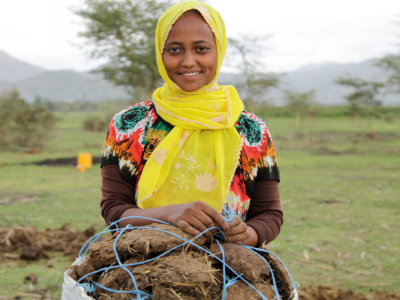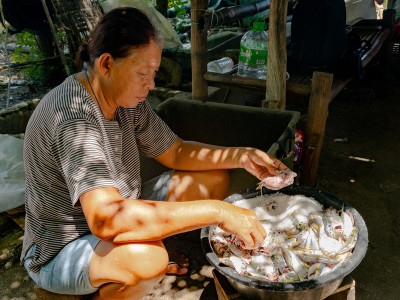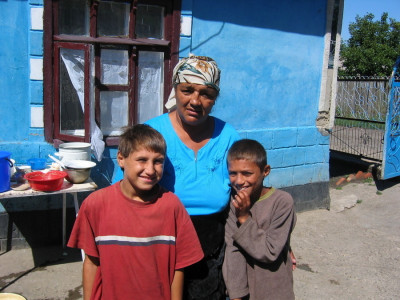Sustainable local development by promoting Local Tourism by migrants and their families through Homestay (HOST Project)
Related Sustainable Development Goals and Global Compact for Migration Objectives
Summary
This project comes from the JMDI Phase II, a UN Joint Migration and Development Initiative, run in cooperation by IOM, UNDP, ILO, UN Women, UNFPA, UNITAR which took place from 2012 to 2017 and worked to encourage local tourism initiatives by setting up and supporting homestay facilities among (potential) migrant or migrant affected families where capacity building in hospitality, homestay, financial management, organic farming and tourism promotion were essential components.
Over 10% of the population in both Kaski and Tanahu are emigrants due to the lack of local employment opportunities. The majority of the migrants from these regions previously worked in the agricultural sector therefore the high rate of emigration has strongly impacted the sector and left uncultivated lands. The population left behind is mostly mono-parental families with a woman at the head of household. They encountered increasing difficulties in accessing basic services such as education, health, transportation and mostly live thanks to remittances.
The project fostered the development of the local communities by enhancing the economic wellbeing of returned migrants, families affected by migration, and potential migrants through the establishment of homestay services. Homestays are community based residential sites for tourists. They promote community interaction between the tourists and the local hosts (households in the villages). Through homestay, visitors get to integrate into the host community’s way of life by experiencing their local culture and customs and can become an additional income and livelihood opportunity for the local community. These homestays have paved the way for a growing tourism sector, which has also provided further employment and business opportunities for the overall community, through, for example, the provision of additional services and goods to the tourists using the homestays. During the one-year period, each of the 29 participating households in Kalabang and Ranagaun hosted 12 to 14 guests. As a result, there was a steady rise in household income (as each participating household made approximately 12,000 to 14,000 NPR) and the popularity and demand for homestays increased. Towards the end of the project there were instances where some clients had to be turned away since all available rooms were already taken.
Key objective
The HOST Project aimed specifically at encouraging local tourism initiatives by setting up and supporting homestay facilities among (potential) migrant or migrant affected families where capacity building in hospitality, homestay, financial management, organic farming and tourism promotion was an essential component to ensure success. Moreover, through the inclusion of local youth in these activities as well as through awareness campaigns on the risks of irregular migration, local youth was empowered and provided with an alternative to risky migration practices. Finally, cooperation and coordination with tourism entrepreneurs was essential to support the homestay facilities to grow and provide further employment opportunities, thus leading to local development and enhancing living conditions among the most vulnerable. The community at large benefitted from increased tourism where they can participate in the process selling goods and other services to tourists. The good practices and lessons learned from this project will then be fed into a proposal for further up-scaling and replication in other districts where pertinent.
Main activities
The most important activies of the HOST project are outlined below:
- Culturally sensitive information campaigns to encourage equal participation of all community members
irrespective of their caste, gender, or ethnicity in the targeted districts - Promote homestay businesses to eliminate
caste and ethnic disparity in the community and promote local development - During a one-year period, each of the 29 participating households in Kalabang and Ranaguan
hosted 12 to 14 guests - As a result of the homestay initiative, there was a steady
rise in household income - Capacity building was provided to the homestay staff as well as other
community members - Training was provided in various areas, such
as organic farming, cooking, hygiene, tourist guide training, and coffee growing - A village interaction
programme on culture and environmental conservation was carried out
Key successes or innovative factors, good practices and lessons learned (if available)
The main lessons learned from this project highlight that:
- Participatory, inclusive and consistent coordination mechanisms were
crucial to ensure the engagement of all actors and the successful set up
of the homestay businesses - Homestay initiatives provide an excellent opportunity to foster development
- Migrants or returnees can play an essential role in promoting the social,
cultural and economic rights of the marginalised in their home communities
due to their own experience of exclusion during their migratory
journey - Guaranteeing empowerment (both social and economic) of the lower caste is important for their social inclusion
- Measures that promote increased interaction among the diverse community
members enhance their social cohesion and ethnic tolerance
Beneficiaries
The direct beneficiaries of the HOST Project are migrants and their families in the Kaski and Tanahu districts as well as the entire communities.


